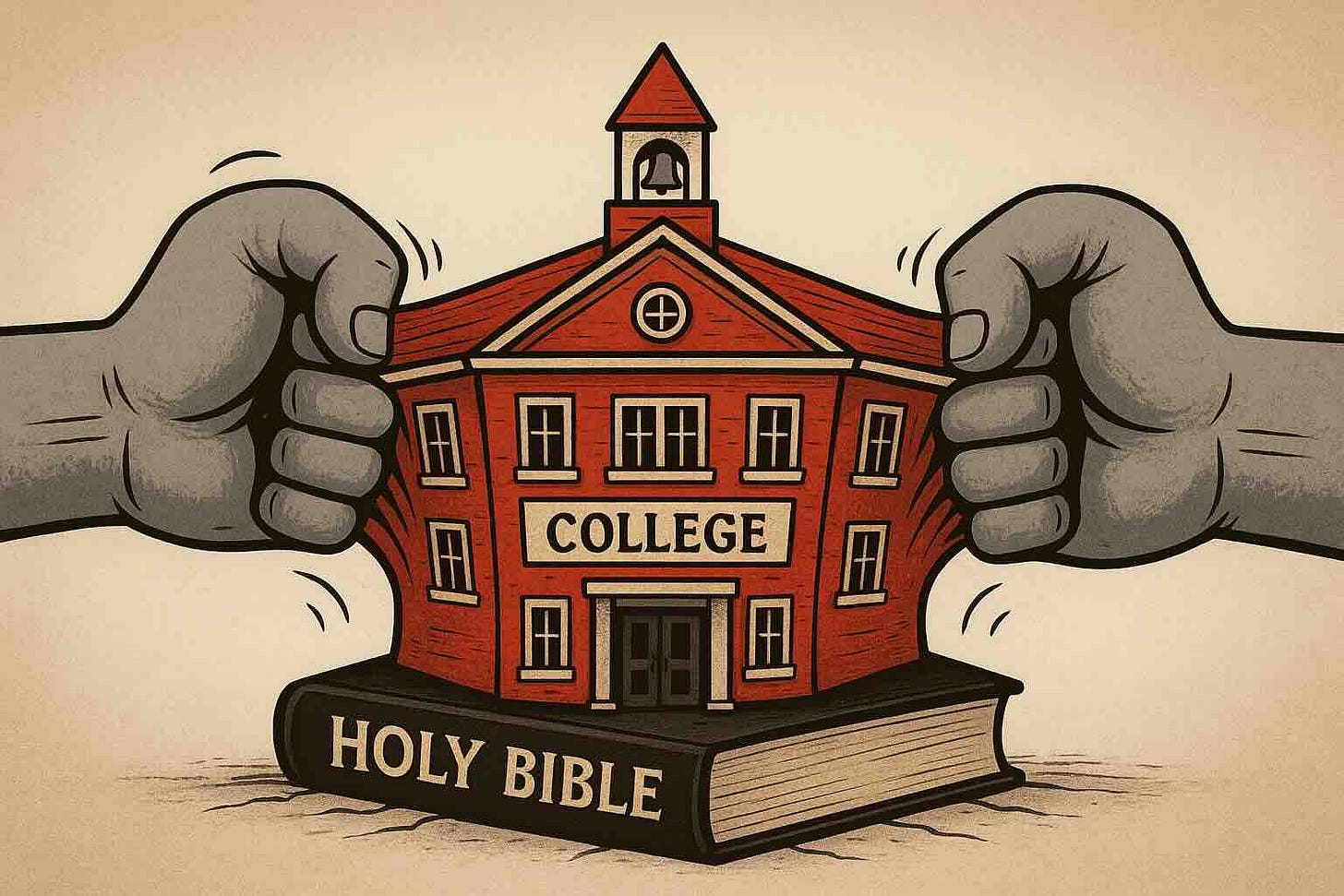The Compression of the Christian College
What if a Christian college today sought to restore the teaching of the New Testament in the life of its students? This would mean that it rejected misguided human religious traditions and sacrificed the personal preferences of administration and faculty in obedience to the Bible. It would also mean that it sought to unite Christians in simple Biblical faith. Passages like John 17:11-12 would become rallying cries for this.
“Holy Father, keep them in your name, which you have given me, that they may be one, even as we are one. While I was with them, I kept them in your name, which you have given me. I have guarded them . . . ”. (John 17:11-12)
What if a contemporary Christian college sought a Christian unity through commonsense obedience to the Apostolic writings? It would find that most of its students came from family and churches that sought a similar goal, even as all other students were welcomed based on their personal commitment to a shared mission to be educated to follow Christ in service to God and others.
What if the unity and identity of the school was sustained not by the secular government, or the power of a centralized denominational structure, or the endowment of some other para-church religious institution? When times were hard, what if such a school would not maintain itself by accommodating an inclusion of a wide variety of different religious beliefs simply to grow or maintain its enrollment?
Such a college would not be a church, a state school, a denominational business, or a partisan or ecumenical college. It would not seek to identify with or influence any group of churches, but its employees would belong to different local church congregations seeking to restore the beliefs and faithful practice witnessed to in the New Testament.
This college’s employees would be partners, having fellowship in educating college students according to the Scriptures, kept and pressed together by God’s Word. They would be pressed together by the positive pull of God’s Word and the negative pressure of this world, which often undermines such a college and seeks to destroy the faith of its students.
Between the foundational pull of God and the oppositional push of this world, the faculty and staff would be compressed into a college community in which they are both partners in sharing the gospel (as Paul says about the Philippian Christians in Phil 1:4) and partners in the tribulation (as John says to his Christian audience in Rev 1:9).
“I, John, your brother and partner in the tribulation and the kingdom and the patient endurance that are in Jesus, was on the island called Patmos on account of the word of God and the testimony of Jesus.” (Revelation 1:9)
The word here for “tribulation” (θλῖψις) might be literally translated “the pressure” or the “compression” in the Greek. In such a compression between God and the world, this Christian college might be variously called the “non-institutional institution,” a “countercultural culture,” the “innovative restorationists,” a “sectarian liberal arts college.”
Again, this unity would not be based on an expansive, ecumenical inclusion of differences, but a theological compression that reduces what the faculty professes in the classroom to what is in keeping with God’s Word (though the school exposes its students to the full variety of religious traditions, secular theories, and academic disciplines). In this compression, the college guides student life on campus to suppress the world’s influence (though the students are always free to make their own choices). These intentional constraints would draw the employees together and attract parents and students to them.
It would also likely keep the school a relatively small college. This Christian college’s theological and cultural compression would constrain it as an educational business because as Jesus said, “the gate is narrow and the way is hard that leads to life, and those who find it are few.” (Matthew 7:14). Literally, the Greek word for “hard” here (θλίβω) means “hard pressed” or “compressed.” And lest we think that this compression of the college is only a negative thing, let me remind you that the apostle Paul observes that the compression of our lives in service to God, though it brings difficulty, is precisely where we most fully follow Christ and He is best seen in us.
“We are compressed (θλιβόμενοι) in every way, but not crushed . . . always carrying in the body the death of Jesus, so that the life of Jesus may also be manifested in our bodies. For we who live are always being given over to death for Jesus’ sake, so that the life of Jesus also may be manifested in our mortal flesh.” (2 Corinthians 4:8-11)
In this college’s employees and students, this Christ-centered, Bible-based, counter-cultural unity is manifested in an independent, non-conformist, and purpose-driven mindset among most of the students. This restorationist mindset would be seen on campus in everything from community service events to devotional student groups, to mission trips and hospitable employee homes, to the rigorous curriculum and job-placement efforts that help find vocations for graduates who transform the world through the gospel.
In short, what if a Christian college was higher education for deeper discipleship? Let us pray that God grows and sustains such a college, blessing it to His glory.*
*An earlier version of this article was presented at the faculty/staff presession at Florida College, August 12, 2025.


